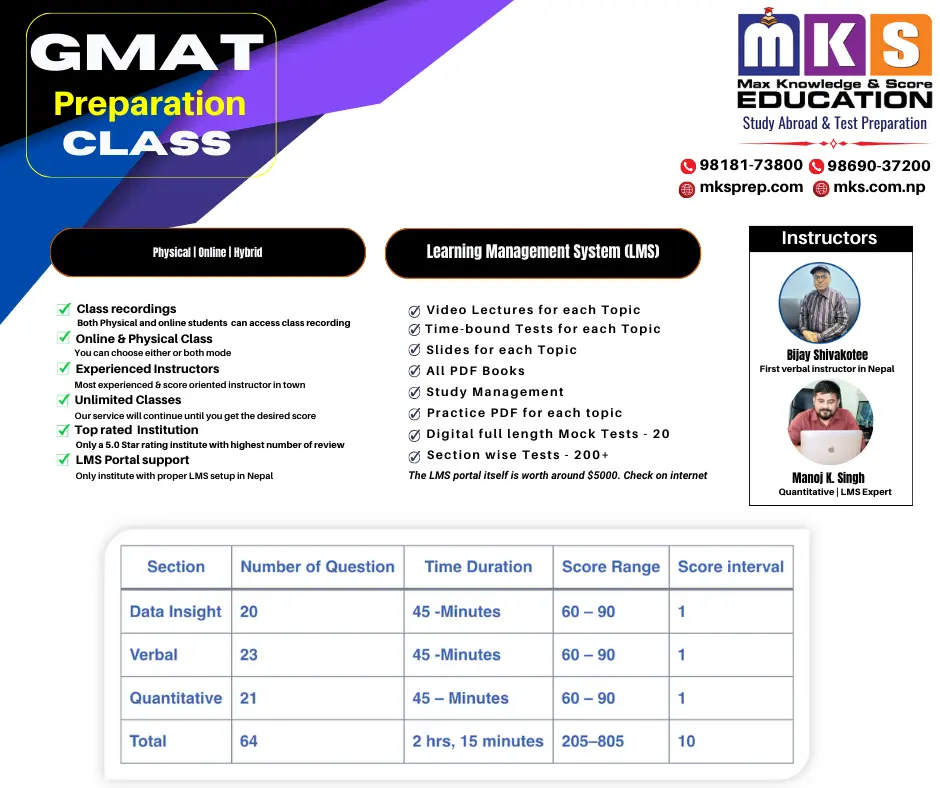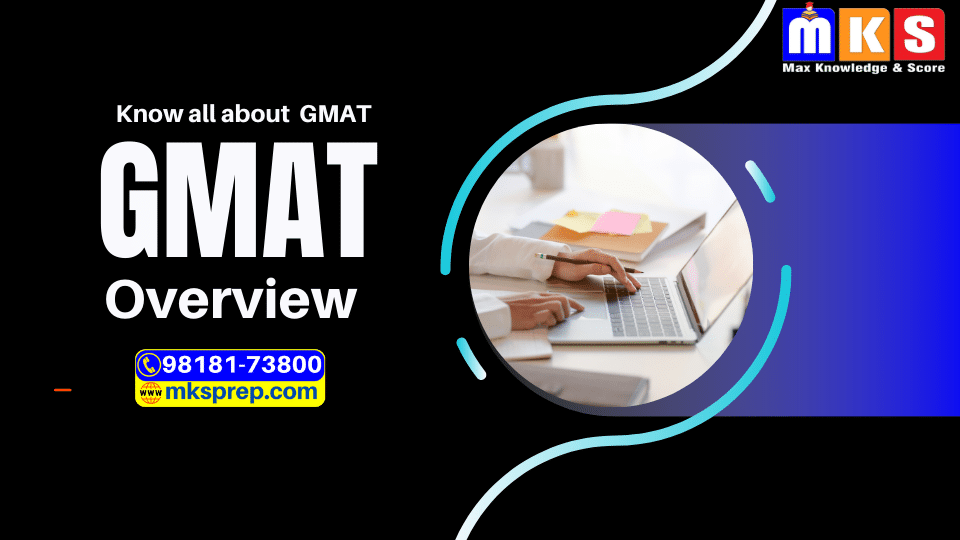
Best GMAT Class in Nepal
Please fill out the form. Our counselor will reach out to you soon.
Best GMAT Class in Nepal
Best GMAT Class in Nepal. As Nepal’s leading GMAT preparation and practice center, we at MKS Education pride ourselves on delivering high-quality study materials and services. Our commitment to excellence is reflected in our comprehensive offerings, which stand unrivaled in the market. Whether you choose our physical or online classes, you’ll benefit from our state-of-the-art Learning Management System (LMS) portal, providing unparalleled support throughout your GMAT journey. We understand the importance of flexibility and convenience, so we ensure that online and physical students can access class recordings for comprehensive review and reinforcement of critical concepts.
Physical | Online Class
Discover versatile GMAT preparation choices through our array of online, in-person, and hybrid classes. Opt for singularly or blend multiple formats to craft a personalized learning journey engineered to elevate your GMAT achievements.
Class Recording
Gain entry to our archived GMAT sessions whenever and wherever you prefer. Revisit course material on your own schedule to strengthen comprehension and enrich your test readiness endeavor.
Unlimited Class
Attain your desired score with continuous entry to our GMAT sessions, even beyond the culmination of the course. Persist in participating in classes until you attain your envisioned level of performance, ensuring the utmost achievement.
Experienced Instructors
Benefit from the expertise of our seasoned GMAT educators acknowledged for their exceptional records in securing top G scores in Nepal. Rest assured of receiving superior test preparation of the utmost caliber, positioning you for success.
Digital Mock Test
Featuring weekly full-length tests, daily half-length tests, and an impressive library of over 300 sectionwise tests. These meticulously crafted evaluations closely emulate the structure and difficulty of actual GMAT tests. Leveraging these resources has consistently demonstrated their effectiveness in mastering the GMAT exam.
LMS Portal Support
Exclusively within Nepal, our MKS EducationLearning Management System (LMS) Portal presents three distinct categories of digital assessments: Comprehensive full-length tests, targeted Sectionwise Tests, and daily practice tests. These unique offerings ensure a specialized test-taking experience for our users.
MKS Education for LMS Portal and other information
MKS GMAT App for class assistance.
| Section | Number of Question | Time Duration | Score Range | Score interval |
|---|---|---|---|---|
| Data Insight | 20 | 45 -Minutes | 60 – 90 | 1 |
| Verbal | 23 | 45 -Minutes | 60 – 90 | 1 |
| Quantitative | 21 | 45 – Minutes | 60 – 90 | 1 |
| Total | 64 | 2 hrs, 15 minutes | 205–805 | 10 |
MKS Education’s Accomplished GMAT Instructors
Recognizing the Significance of Seasoned Instructors in GMAT Preparation
The process of selecting the ideal GMAT institute entails a thoughtful assessment of the instructors’ backgrounds and qualifications. Considering the intricate nature of the GMAT, the presence of instructors with established expertise holds paramount importance. Some institutions may opt for recent graduates as instructors for GMAT courses, prioritizing financial gains over educational quality. To ensure an excellent learning experience, it’s crucial to delve into instructors’ profiles and validate their extensive experience within the field.
At MKS Education, our team of instructors boasts exceptional proficiency and an unwavering commitment to facilitating students in achieving remarkable GMAT scores:

GMAT Quantitative Instructor
Quantitative Expert: Mr. Manoj K. Singh Mr. Singh brings extensive experience and a dedicated score-centric approach to his role as a GMAT instructor. Prioritizing students’ needs, he developed a cutting-edge Learning Management System (LMS) to streamline the study process and address their specific requirements. This innovative system enhances students’ overall learning experience.

GMAT Verbal Instrucror
Verbal Expert: Miss Sanjita Pandy is Nepal’s foremost instructor for GMAT and language proficiency tests, distinguished as a Real GMAT Test Taker with a 96th percentile score and an exceptional dedication to achieving high scores. Her teaching career commenced in 2016, and since then, she has wholeheartedly committed herself to providing unmatched guidance to students, ensuring they receive unparalleled support in their test preparation endeavors.
By choosing MKS Education, you can trust that our experienced instructors will provide the exceptional guidance and support you need to succeed on the GRE.
Unlock Your Potential with the Best GMAT Classes at MKS Education: Physical, Online, and Hybrid Classes to Meet Your Needs!
GMAT Introduction
Are you ready to conquer the GMAT and achieve your dreams of attending a top business school? Look no further than MKS Education, offering the best GMAT classes in the industry. Our comprehensive program, including physical, online, and hybrid classes, caters to your unique needs and ensures you are fully prepared for this challenging exam. Please keep reading to discover the exceptional features of our GMAT classes and the unparalleled resources that will propel your GMAT scores to new heights.
Flexible Class Options: Morning Classes for Busy Professionals
At MKS Education, we understand the demands of a busy schedule. That’s why we offer morning classes for students in grades 7 to 9, ensuring you can fit GMAT preparation into your daily routine. Whether you prefer physical, online, or hybrid classes, our flexible options cater to your unique learning preferences.
Exceptional Features: Everything You Need to Succeed
- Class Recordings: Did you miss a class? No problem! Access to class recordings allows you to catch up on course material at your convenience.
- Unlimited Classes: At MKS Education, we believe in providing students with ample opportunities to master the GMAT. Our unlimited class policy ensures you receive the support you need to excel.
- Experienced Instructors:
At MKS Education, we take pride in our team of highly qualified instructors who are dedicated to helping you reach your full potential on the GMAT. Get to know our star instructors: - LMS Support: Our comprehensive Learning Management System (LMS) equips you with the resources needed to excel in your GMAT preparation.
Comprehensive LMS: All the Tools You Need to Master the GMAT
MKS Education’s LMS includes an extensive range of resources designed to help you succeed:
- 25 full-length tests that simulate the real GMAT experience
- 200+ section-wise tests to hone your skills in specific areas
- PowerPoint presentations on each topic for clear and concise explanations
- Extended concepts on each topic to deepen your understanding
- PDF practice questions on each topic for additional practice
- Hard-copy books for offline study
- Expert instruction from the industry’s best instructors
GMAT Test Format 2024
GMAT is a global entrance examination for MBA College; however, another excessive number of students additionally accept the GMAT Test. There are 3 primary sections in GMAT: Data insight, Quantitative Reasoning, and Verbal Reasoning. Rating and time for different provinces are the next.
During the exam, a candidate can take two “8-minute breaks.”
MKS Education offers the best GMAT classes, with a wealth of resources and experienced instructors to guide you on your path to success. Our flexible class options, including physical, online, and hybrid classes, ensure you receive the support you need to excel on this challenging exam. Today, begin your journey to a top business school by enrolling in our top-rated GMAT classes at MKS Education.

Data insight
Candidates must analyze and evaluate information presented in various formats in this section. The questions in this section will test your numerical and verbal abilities.
1. Multi-source reasoning:
You must compare, interpret, or apply the information presented in tables, graphs, diagrams, written passages, and other visual representations.
2. Table analysis:
A candidate must determine statistics, ratios, probabilities, or proportions from a spreadsheet-like table in these questions.
3. Graphics interpretation:
Fill-in-the-blank questions will be asked based on bar graphs, bubble graphs, and line graphs.
4. Two-part analysis:
Candidates must determine trade-offs, calculate proportions, and select answers that will be presented in a tabular format in these questions.
5. Data Sufficiency
Data sufficiency is a problem-solving approach in quantitative aptitude tests and assessments. In these questions, you are provided with a question followed by some data and asked to determine whether the given data is sufficient to answer the question.
Data sufficiency questions require critical thinking and logical reasoning skills rather than complex mathematical calculations. They test your ability to analyze information and decide based on limited data, reflecting real-world problem-solving scenarios.
Quantitative Reasoning
It assesses candidates’ ability to analyze data and draw conclusions based on logic.
Number Property
The Number Properties concept in the GMAT quant section involves understanding various properties and relationships of integers, fractions, decimals, and prime numbers. It encompasses topics like divisibility, factors, multiples, even and odd numbers, prime factorization, and properties of exponents.
Questions about number properties may appear in problem-solving and data-sufficiency formats on the GMAT. Mastery of these concepts helps test-takers solve quantitative problems efficiently and accurately, often by leveraging number properties to simplify calculations or identify patterns.
Algebra
Algebra plays a crucial role in the quantitative section of the GMAT, testing a candidate’s ability to manipulate algebraic expressions, solve equations, and analyze relationships between variables.
Advanced Topic
Advanced topics in the GMAT, such as permutation and combination, probability, statistics, and data interpretation, are essential for tackling complex quantitative reasoning questions.
Word Problem
Inequalities, equations, functions, exponents, and absolute values are all covered in algebra.
Circles, lines, angles, solids, coordinate geometry, and polygons are all examples of geometry.
Ratio and proportion, fractions, decimals, percentages, discrete probability counting methods, and sets are all covered in arithmetic.
Time and work, rate, simple and compound interest, discounts, profit and loss, data interpretation, measurement issues, and geometry questions are all examples of word problems.


Verbal Reasoning
This section assesses candidates’ ability to comprehend written material, evaluate arguments, and edit written material to meet standard English requirements.
Reading Comprehension
Reading comprehension questions require you to refer to a passage of up to 350 words and respond to questions about the main idea, supporting ideas, context, style, and tone, among other things.
These questions test a candidate’s ability to evaluate arguments and formulate/evaluate an action plan.
These questions are divided into four categories: agreement, grammatical construction, logical predication, parallelism, idiom, verb form, and rhetorical structure.
Critical Reasoning
Advanced topics in the GMAT, such as permutation and combination, probability, statistics, and data interpretation, are essential for tackling complex quantitative reasoning questions.
LMS Portal features
Time-bound Test
Interactive Slide Show
Post Class Plan
Video Lectures
The GMAT is a computer-adaptive test.
After discussing the GMAT pattern, we will explain how the GMAT test is computer-adaptive. The Verbal Reasoning and Quantitative sections of the GMAT format are computer-adaptive out of the four sections. The test’s difficulty level changes depending on the test taker’s ability. This feature allows the test to assess the candidate’s abilities accurately. This is why business schools rely on GMAT test scores to determine whether or not to admit applicants.
The first question, whether in the Quantitative or Verbal Sections, is moderately complex. As you progress through the test, the computer scores your answers and uses them and your responses to answer the following question. If you get the first question wrong, the next question will be more straightforward. If you correctly answer the second question, the next question will be more difficult. This process continues until the candidate’s ability in that particular subject is accurately assessed.
Because the computer uses your answers to select the next question, test takers cannot return to change their answers. As a result, it’s critical to give accurate answers because you won’t be able to change them later.
FAQs for GMAT Class
Q: What is the GMAT?
A: GMAT stands for Graduate Management Admission Test. It is a standardized test used to assess the aptitude of students who are applying to graduate business programs, such as MBA programs.
Q: Who administers the GMAT?
A: The Graduate Management Admission Council (GMAC) administers the GMAT.
Q: What is the format of the GMAT?
A: The GMAT consists of four sections: Analytical Writing Assessment, Integrated Reasoning, Quantitative, and Verbal. The test is taken on a computer and takes about 3.5 hours to complete.
Q: How is the GMAT scored?
A: The GMAT is scored on a scale of 200 to 800, with 10-point increments. The scores are valid for five years.
Q: What is an ideal GMAT score?
A: The ideal GMAT score is typically considered to be in the range of 650 to 700. However, the score requirements vary depending on the specific program you are applying to.
Q: How often can I take the GMAT?
A: You can take the GMAT once every 16 days, up to five times in a rolling 12-month period.
Q: How long does it take to receive my GMAT scores?
A: You will receive your unofficial GMAT scores immediately after completing the test. Your official scores will be available within 20 days of your test date.
Q: How should I prepare for the GMAT?
A: It is recommended to start preparing for the GMAT several months in advance. You can prepare by taking practice tests, studying test-taking strategies, and reviewing the material covered on the exam. There are many test prep courses and resources available to help you prepare.
Q: Do I need to take the GMAT to apply to business school?
A: Many graduate business programs require the GMAT as part of the application process, but some programs may accept other standardized tests, such as the GRE. It is important to check the specific requirements of the programs you are interested in.
Q: How long are GMAT scores valid?
A: GMAT scores are valid for five years from the date of the test.
Q: Can I cancel my GMAT score?
A: Yes, you can cancel your GMAT score at the test center immediately after taking the test. You can also cancel your score online within 72 hours of taking the test.
Q: How much does it cost to take the GMAT?
GMAT Related Pages
[ratemypost]
GMAT Official website links
Listed below are some official GMAT links that you may find useful:
- GMAT Official Website: https://www.mba.com/exams/gmat – This website is the official website for the GMAT exam, where you can find out more information about the exam format, registration, preparation materials, and other resources related to the exam.
- GMAT Test Center Locator: https://www.mba.com/exams/gmat/find/test-centers – This is the official GMAT test center locator tool that you can use to find a GMAT test center close to your location in order to prepare for the GMAT exam.
- GMAT Exam Prep Resources: https://www.mba.com/exam-prep – This is the official GMAT exam preparation page, where you can find a variety of resources to assist you with studying for the exam, including official practice tests, study materials, tips, and strategies, as well as other resources to help you prepare for the exam.
- GMAT Official Score Report: http://www.mba.com/exams/gmat/about-the-gmat-exam/gmat-scores-and-score-reports/understand-and-use-your-scores – This is the official page explaining how to understand and use your GMAT scores, including how to access it and send it to you, as well as how to get your official GMAT score report.
- GMAT Official Blog: https://www.mba.com/the-gmat-blog – The GMAT Official Blog is the official website for the GMAT exam, which provides a lot of helpful information on how to prepare for the exam, insight into business school admissions, and other information that may be helpful to you.
The links below will provide you with reliable, up-to-date, and useful information and resources that will help you prepare for and succeed on the GMAT exam by using these official links.











































